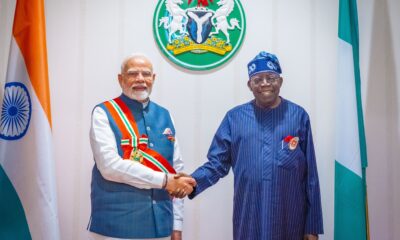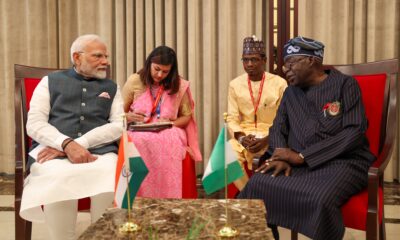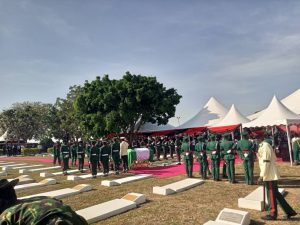NEWS
FG Unveils N155bn In Palliatives For Families, N50k Monthly Grant

The highlight of the National Economic Council (NEC) meeting on Thursday in Abuja was President Bola Ahmed Tinubu’s approval of the National Construction and Household Support Programme (NCHSP).
This was detailed in a statement put out by the presidential spokesman, Ajuri Ngelale on his verified X handle.
It was gathered that the programme was aimed at boosting agricultural productivity, strengthening the economy, and providing immediate economic relief for Nigerian families.
Ngelale added that the programme, was supported by the NEC, includes financial allocations and infrastructure projects across all geo-political zones in the country.
He highlighted that a key component of the programme was the approval of the N50,000 uplift grant to be distributed to 100,000 families per state for three months.
He disclosed that another N155 billion was earmarked for the purchase and distribution of assorted foodstuff across the nation to address concerns about food security and affordability.
According to him, the programme will also cater to infrastructure projects, including the Sokoto-Badagry Highway, which will traverse seven states and is considered key for agricultural sustainability.
He noted that the states along this axis form the food belt of the nation.
Other infrastructure initiatives include the ongoing Lagos-Calabar Coastal Highway and the Trans-Saharan Highway. Tinubu also approved full counterpart financing for the Port Harcourt-Maiduguri Railway and the Ibadan-Abuja segment of the Lagos-Kano Standard-Gauge Railway.
In addition to the projects, Ngelale said the NEC approved the allocation of N10 billion to each state and the Federal Capital Territory for the procurement of buses and implementation of the Compressed natural gas uplift programme.
According to the presidential spokesman, provisions were also made for labour unions and civil society organizations.
During the NEC meeting, Tinubu urged state governors to collaborate in meeting the needs of citizens and boosting food production in the country.
He said, “Our states must work together to deliver on the critical reforms required of us to meet the needs of our people. Time is humanity’s most precious asset. You can never have enough of it. It is getting late.
“We are ready and able to support you in the form of the mechanization of your agricultural processes and the provision of high-quality seedlings.
“We are prepared to provide solar-powered irrigation facilities to support our farmers across seasons, but we must now produce. We must produce the food our people eat, and it will require coordination and intentionality between members of the National Economic Council (NEC).
“There is nothing we are doing that is more important than producing high-quality food for our people to consume, buy, and sell. We create jobs in the production of it. And that is before we generate wealth by exporting the excess. It is not beyond us to achieve this for Nigerians.
“How much support do you need from me, and in what form? I am prepared to provide it. But we must achieve the result. We must deliver on our targets at all levels. Please report back following your consultations and submit to my office within seven days.”
NEWS
Senator Ifeanyi Ubah Laid To Rest In Nnewi Amidst Tight Security
On Friday, November 22, 2024, the late Senator Ifeanyi Ubah was laid to rest in his hometown of Nnewi, Anambra State.
The funeral, held at his residence in Umuanuka, Otolo Nnewi, was attended by a multitude of mourners, including political figures, business associates, and community members, all paying their final respects to the esteemed businessman and politician.
The burial proceedings commenced with a funeral mass at 10:00 a.m., followed by condolence visits and other funeral activities. The ceremonies are scheduled to continue through the weekend, culminating in a Thanksgiving Mass and Outing Service on Sunday, November 24, at St. Peter Claver Catholic Church in Otolo Nnewi.
READ MORE: JUST IN: Anambra Senator, Ubah, Dies In London
In light of security concerns, Anambra State Governor, Prof. Chukwuma Soludo, ordered the closure of schools in Nnewi for a week. This decision followed threats from separatist elements who vowed to attack those attending the burial. A circular from the state Ministry of Education directed school principals to inform parents and ensure students remained at home during this period.
The Anambra State Police Command addressed an incident that occurred on Wednesday night, clarifying that it was not related to the burial. According to the Command’s Public Relations Officer, SP Tochukwu Ikenga, the incident involved security operatives mistakenly engaging police personnel, leading to an exchange of gunfire. The situation has since been brought under control.
Senator Ifeanyi Ubah, who represented Anambra South Senatorial District, passed away in London in July 2024 at the age of 52. His death was met with an outpouring of grief from across the nation, with many acknowledging his significant contributions to the development of Anambra State and Nigeria.
As the community of Nnewi and the nation at large bid farewell to Senator Ubah, his legacy as a philanthropist, businessman, and public servant continues to resonate, leaving an indelible mark on those he served and inspired.
NEWS
Simon Ekpa’s Arrest Will Restore Peace In South East, Says Enugu Gov’t
The Enugu State Government has commended the Republic of Finland for the arrest of Simon Ekpa, a Finland-based leader of the proscribed separatist group, Autopilots.
Ekpa has been accused of orchestrating violence and chaos in Nigeria’s South East region.
In a statement issued on Friday by the Secretary to the State Government, Prof. Chidiebere Onyia, the government described Ekpa as a “common criminal, con man, and terrorist” who has exploited the Igbo people while claiming to represent their interests.
RELATED NEWS: Finnish Police Arrest Simon Ekpa Over Terror-Related Allegations
“The Enugu State Government welcomes the arrest of the Finland-based terrorist, Simon Ekpa,” the statement read.
“His arrest and trial will no doubt go a long way in strengthening peace, security, and stability in all parts of the South East.”
The state government accused Ekpa of sponsoring violent activities that have resulted in the loss of lives, destruction of property, and disruption of the region’s economic activities.
It stated that Ekpa’s actions were driven by personal greed and not genuine concern for the Igbo people.
Onyia said, “Ekpa is a murderer and fraudster who delights in killing his people and living large off their misery.
“He thrives on manipulating, exploiting, and extorting the people on the pretext of fighting for their interest and for the restoration of Biafra.”
The government emphasized its readiness to provide evidence of Ekpa’s alleged crimes to support his prosecution, whether in Finland or Nigeria.
“This arrest is in line with the demand of the Governor Peter Mbah Administration, which has repeatedly made it known that Ekpa is a megalomaniac, common criminal, murderer, and fraudster who takes joy in feeding fat on the manipulated emotions of Ndigbo and inflicting misery on the South East region,” the statement added.
The government further criticized Ekpa for fostering a climate of fear and insecurity that has harmed the entrepreneurial spirit and economic growth of the Igbo people.
“Ekpa has for long, and unfortunately from Finland, made a living by creating a siege climate and mentality in the South East, destroying lives, property, and the Igbo trademark of entrepreneurship and hard work,” Onyia said.
The Enugu State Government expressed optimism that Ekpa’s arrest would mark a turning point in the quest for peace and stability in the South East, urging residents to remain vigilant and supportive of ongoing efforts to restore normalcy in the region.
NEWS
JUST IN: COP29 Proposes $250bn Annual Climate Finance Target For Developing Nations
The COP29 presidency has unveiled an ambitious climate finance plan, calling on developed nations to provide $250 billion annually to developing countries by 2035.
The proposal, part of a broader initiative to mobilize $1.3 trillion from public and private sources each year, seeks to address the mounting challenges posed by climate change.
The five-page draft text, released on Friday, emphasizes the need for developed nations to lead the charge in financing climate action.
RELATED NEWS: COP29: Climate Summit Faces Deadlock Over Vague Funding Proposals For Vulnerable Nations
According to the document, this financial commitment is seen as a critical step toward combating the climate crisis and fostering sustainable development globally.
“In this context, it is decided to set a goal in extension of the goal referred to in paragraph 53 of decision 1/CP.21, with developed country Parties taking the lead, to USD 250 billion per year by 2035 for developing country Parties for climate action,” the draft states.
The announcement follows the release of an earlier 10-page draft on Thursday, which drew significant criticism from Global South delegations.
Many expressed frustration that the document lacked clear financial commitments from wealthier nations, falling short of expectations to support adaptation and mitigation efforts.
“There is a clear need to address the principle of common but differentiated responsibilities, especially given the diverse circumstances shaping national priorities,” a negotiator from a developing country delegation remarked.
The updated proposal aims to address some of these concerns by outlining more specific targets. However, skepticism remains among some negotiators, who feel the revisions still fail to adequately address their demands.
Meanwhile, developed countries have raised their own reservations about the proposed plan.
A European negotiator, speaking to Reuters, described the $250 billion annual target as unrealistic and criticized the lack of measures to expand the pool of contributing countries.
“No one is comfortable with the number because it’s high, and there’s almost nothing on broadening the contributor base,” the negotiator said.
The mixed reactions underscore the persistent divide between developed and developing nations in climate negotiations.
While the draft text aims to reconcile these differences, the gap between expectations and commitments remains a significant hurdle.






















